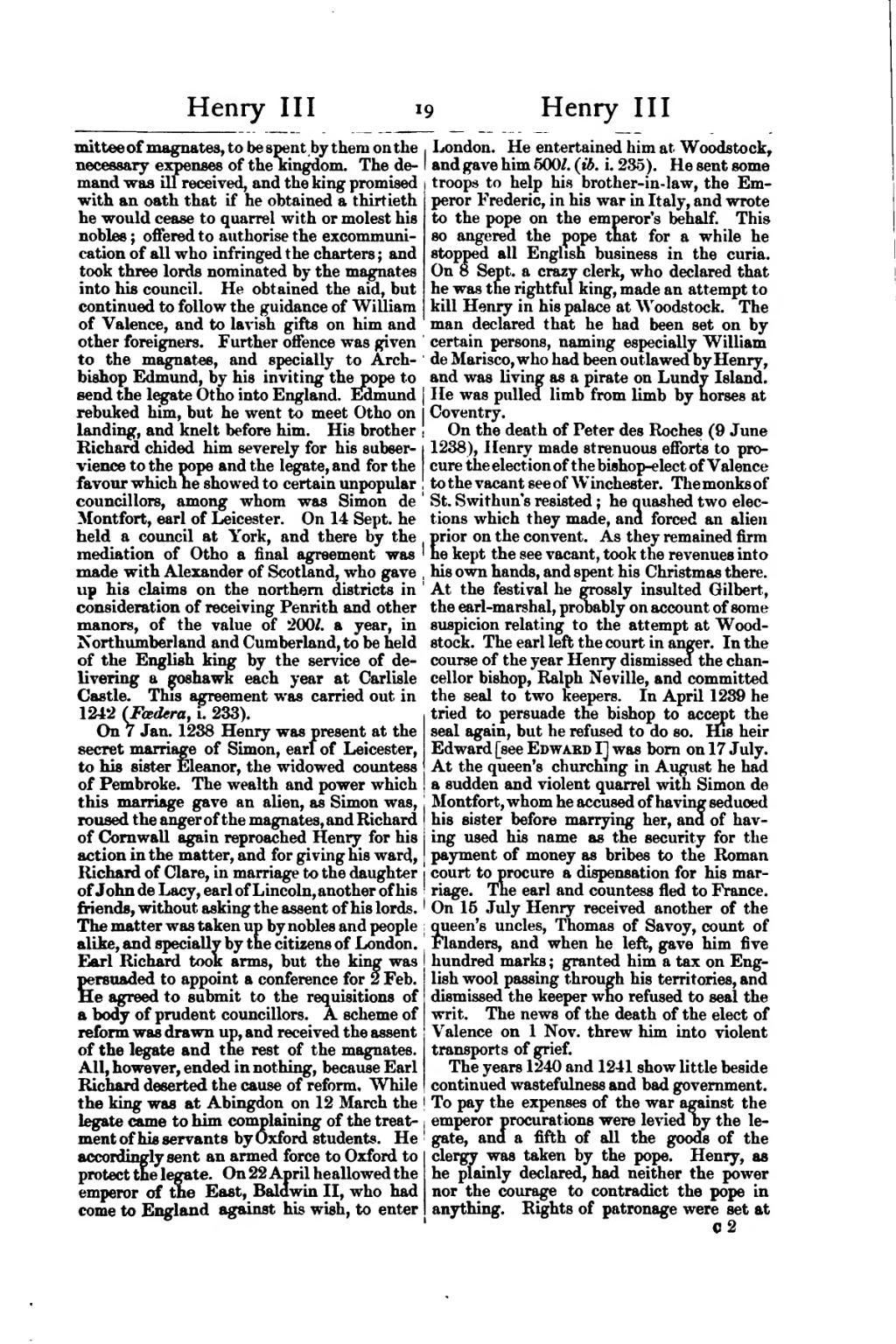mittee of magnates, to be spent by them on the necessary expenses of the kingdom. The demand was ill received, and the king promised with an oath that if he obtained a thirtieth he would cease to quarrel with or molest his nobles; offered to authorise the excommunication of all who infringed the charters; and took three lords nominated by the magnates into his council. He obtained the aid, but continued to follow the guidance of William of Valence, and to lavish gifts on him and other foreigners. Further offence was given to the magnates, and specially to Archbishop Edmund, by his inviting the pope to send the legate Otho into England. Edmund rebuked him, but he went to meet Otho on landing, and knelt before him. His brother Richard chided him severely for his subservience to the pope and the legate, and for the favour which he showed to certain unpopular councillors, among whom was Simon de Montfort, earl of Leicester. On 14 Sept. he held a council at York, and there by the mediation of Otho a final agreement was made with Alexander of Scotland, who gave up his claims on the northern districts in consideration of receiving Penrith and other manors, of the value of 200l. a year, in Northumberland and Cumberland, to be held of the English king by the service of delivering a goshawk each year at Carlisle Castle. This agreement was carried out in 1242 (Fœdera, i. 233).
On 7 Jan. 1238 Henry was present at the secret marriage of Simon, earl of Leicester, to his sister Eleanor, the widowed countess of Pembroke. The wealth and power which this marriage gave an alien, as Simon was, roused the anger of the magnates, and Richard of Cornwall again reproached Henry for his action in the matter, and for giving his ward, Richard of Clare, in marriage to the daughter of John de Lacy, earl of Lincoln, another of his friends, without asking the assent of his lords. The matter was taken up by nobles and people alike, and specially by the citizens of London. Earl Richard took arms, but the king was persuaded to appoint a conference for 2 Feb. He agreed to submit to the requisitions of a body of prudent councillors. A scheme of reform was drawn up, and received the assent of the legate and the rest of the magnates. All, however, ended in nothing, because Earl Richard deserted the cause of reform. While the king was at Abingdon on 12 March the legate came to him complaining of the treatment of his servants by Oxford students. He accordingly sent an armed force to Oxford to protect the legate. On 22 April he allowed the emperor of the East, Baldwin II, who had come to England against his wish, to enter London. He entertained him at Woodstock, and gave him 500l. (ib. i. 235). He sent some troops to help his brother-in-law, the Emperor Frederic, in his war in Italy, and wrote to the pope on the emperor's behalf. This so angered the pope that for a while he stopped all English business in the curia. On 8 Sept. a crazy clerk, who declared that he was the rightful king, made an attempt to kill Henry in his palace at Woodstock. The man declared that he had been set on by certain persons, naming especially William de Marisco, who had been outlawed by Henry, and was living as a pirate on Lundy Island. He was pulled limb from limb by horses at Coventry.
On the death of Peter des Roches (9 June 1238), Henry made strenuous efforts to procure the election of the bishop-elect of Valence to the vacant see of Winchester. The monks of St. Swithun's resisted; he quashed two elections which they made, and forced an alien prior on the convent. As they remained firm he kept the see vacant, took the revenues into his own hands, and spent his Christmas there. At the festival he grossly insulted Gilbert, the earl-marshal, probably on account of some suspicion relating to the attempt at Woodstock. The earl left the court in anger. In the course of the year Henry dismissed the chancellor bishop, Ralph Neville, and committed the seal to two keepers. In April 1239 he tried to persuade the bishop to accept the seal again, but he refused to do so. His heir Edward [see Edward I] was born on 17 July. At the queen's churching in August he had a sudden and violent quarrel with Simon de Montfort, whom he accused of having seduced his sister before marrying her, and of having used his name as the security for the payment of money as bribes to the Roman court to procure a dispensation for his marriage. The earl and countess fled to France. On 15 July Henry received another of the queen's uncles, Thomas of Savoy, count of Flanders, and when he left, gave him five hundred marks, granted him a tax on English wool passing through his territories, and dismissed the keeper who refused to seal the writ. The news of the death of the elect of Valence on 1 Nov. threw him into violent transports of grief.
The years 1240 and 1241 show little beside continued wastefulness and bad government. To pay the expenses of the war against the emperor procurations were levied by the legate, and a fifth of all the goods of the clergy was taken by the pope. Henry, as he plainly declared, had neither the power nor the courage to contradict the pope in anything. Rights of patronage were set at
